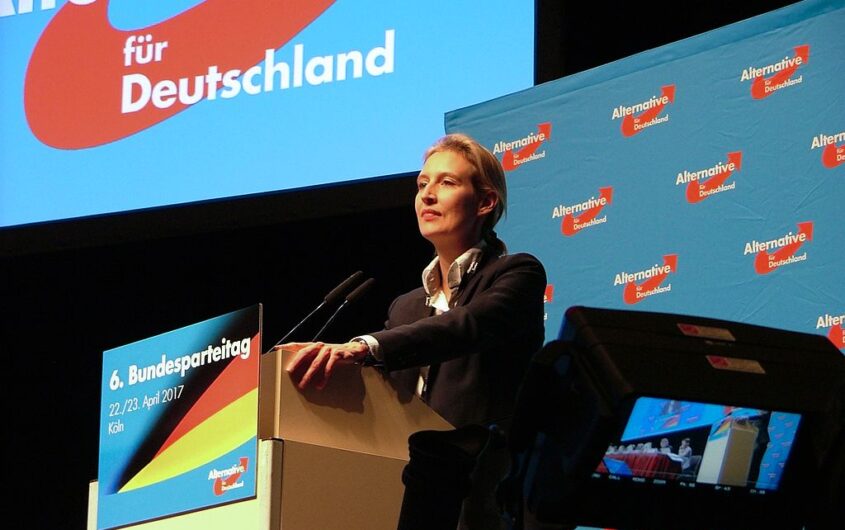
Olaf Kosinsky via Wikimedia Commons
AGI Profiles: Alice Weidel

Kiana Bussa
Halle Foundation/AGI Intern
Kiana Bussa is a research intern at AGI in summer 2024. Ms. Bussa is an undergraduate student at the University of Georgia where she majors in International Affairs and minors in International Human Rights and Security and Data Analytics for Public Policy. At UGA, Ms. Bussa has conducted independent research with the GLOBIS Human Rights Research Lab and developed policy-related skills in the Security Leadership Program with the Center for International Trade and Security. In her spare time, she debates with the Phi Kappa Literary Society.
Member of the Bundestag and Co-Chair of the AfD
As Germany anticipates the September state-level elections in Brandenburg, Thuringia, and Saxony, the Alternative for Germany (Alternative für Deutschland, AfD) continues to capture media attention. While figures such as Björn Höcke attract interest at the regional level, the national leadership of AfD remains a focal point in the national discourse. At the helm of the party is Alice Weidel, the co-leader of the party with big plans for its future.
An economist, mother, and onetime investment banker from a well-to-do family in West Germany, Alice Weidel does not fit the (media-driven) conventional image of a far-right party leader. She is highly educated, completing her dissertation in China on a scholarship from the Konrad Adenauer Foundation. She speaks fluent Mandarin and her wife is a Sri Lankan-Swiss filmmaker. Before politics, she worked at Allianz Global Investors and Goldman Sachs. These characteristics are somewhat surprising for someone in the AfD, and they only increase her notoriety: scores of media outlets wonder about the party “PR curiosity.” Media attention especially draws attention to the apparent incongruence between her identity and positions. Weidel has often been characterized as a woman of contradictions: she is both a lesbian and a proponent of “traditional values,” a German nationalist and a Swiss resident.
Weidel’s position as one of the few women leaders in the AfD certainly contrasts with the overall tone of the party. Esther Lehnert, a right-wing populism expert from Berlin’s Alice Salomon University, describes the AfD as “steeped in chauvinism and sexism. It revels in this sort of leery sexist blokeism.” In this environment, Weidel has been able to stand out. Her cosmopolitan image and media savvy, complete with her tidy wardrobe and academic economics background, offer the party “an aura of bourgeois respectability that has strong appeal for middle-class voters beyond its traditional hard-right base,” according to Hans Vorländer, a political scientist at Dresden University of Technology. With this image, she rose quickly in the party ranks. In a bid to soften the AfD image and broaden its appeal, she became a leading candidate for the party in 2017. She was re-elected as co-leader of the party alongside Tino Chrupalla in July 2024 with 80 percent of the vote.
Like the rest of the AfD, immigration is her defining political issue. Her criticism of immigration policies typically centers around a law-and-order society. She sees immigration, particularly immigrants from Arab or Muslim backgrounds, as intrinsically linked to crime. Weidel, alongside co-leader Chrupalla, called for “secure borders and a fortress Europe” following the May 2024 murder of a German police officer by an Afghan migrant. She told Bloomberg in December 2023 that if the AfD were to secure a position in a coalition government, their first agenda item would be to close German borders. She has also repeatedly called for illegal immigrants to be expelled from Germany. While opposition to immigration typically centers around presumed Arab or Muslim immigrants, Weidel has also pushed back against the 1.1 million Ukrainian refugees currently settled in Germany, vaguely commenting that they will have to return to Ukraine eventually.
Many commentators suggest that Weidel is a key messenger for the AfD’s narrative that immigrants threaten the safety and well-being of German women and LGBTQ+ Germans, pointing to her use of terms like “headscarf girls” and “knife-wielding men” to describe migrants. This brand of far-right politics called homonationalism aligns “the politics of racism and nationalism” with feminist and gay rights discourse. While these elements are undoubtedly infused in her and the AfD’s politics, Weidel seems to generally downplay her own gender and sexual orientation in her political speech. She regularly dodges questions related to her identity and avoids making statements on the sexist and homophobic comments by other members of her party. In this way, Weidel perhaps takes after her self-proclaimed role model Margaret Thatcher.
As co-leader of the party, Weidel has been forced to confront several scandals that have rocked the AfD in the last year. On Björn Höcke’s recent convictions by a German court for knowingly using a Nazi slogan, Weidel commented, “The AfD has different currents. Mr. Höcke represents one of these currents and we have to accept that.” When news broke that Maximilian Krah’s top assistant was arrested for spying for the Chinese government, Weidel and Chrupalla released a joint statement: “Any influence exerted by foreign states through espionage, as well as any attempt to buy opinions and positions, must be investigated and stopped with the utmost severity.”
Weidel is not immune to her own set of public scandals. In 2017, she came under fire for a leaked email in which she called for German “genetic unity” and lamented the “self-defeated dissolution of our culture.” That same year, it was reported she illegally hired a Syrian asylum seeker to do household cleaning without a work contract. In 2018, she was formally investigated and fined 402,900 euros for violating campaign finance laws over large foreign donations from a Swiss company. Perhaps worst of all, Weidel terminated her personal aide and close strategist Roland Hartwig for attending meetings with neo-Nazi and extremist groups over a “masterplan” for mass deportations in the event of an AfD electoral victory. Amid Weidel’s attempts to downplay the report, Lars Klingbeil, a leading member of the Social Democrats, accused Weidel of being a “wolf in sheep’s clothing.”
Critics suggest that Weidel is not in control of her own party and that her relatively weak leadership has allowed the most extreme fringe of the party to flourish. Weidel was once a key member in the push to have hardliner Björn Höcke removed from the AfD, but today she can be found sharing the same stage as him. Weidel’s support for extreme hardliner Maximilian Krah, despite apparent warnings from within the party, ultimately resulted in the powerful French National Rally distancing themselves from the AfD and removing the party from the Identity and Democracy group in the European Parliament. Likewise, the news of the “masterplan” meeting for mass deportations triggered nationwide mass protests and moves for the AfD to be fully banned. It remains to be seen how these events will affect the coming state parliamentary elections.
While she has her fair share of critics, for now, Weidel remains central to the AfD platform. It is an “open secret” that Weidel is interested in running as a candidate for German chancellor in 2025. While it is unlikely she could secure enough votes (Weidel herself admits that AfD will not come to power nationally until at least 2029), she remains certain that the party will eventually form a coalition with the Christian Democratic Union (CDU), breaking the CDU’s traditional cordon sanitaire policy, offering a much her a much larger role in the future.








